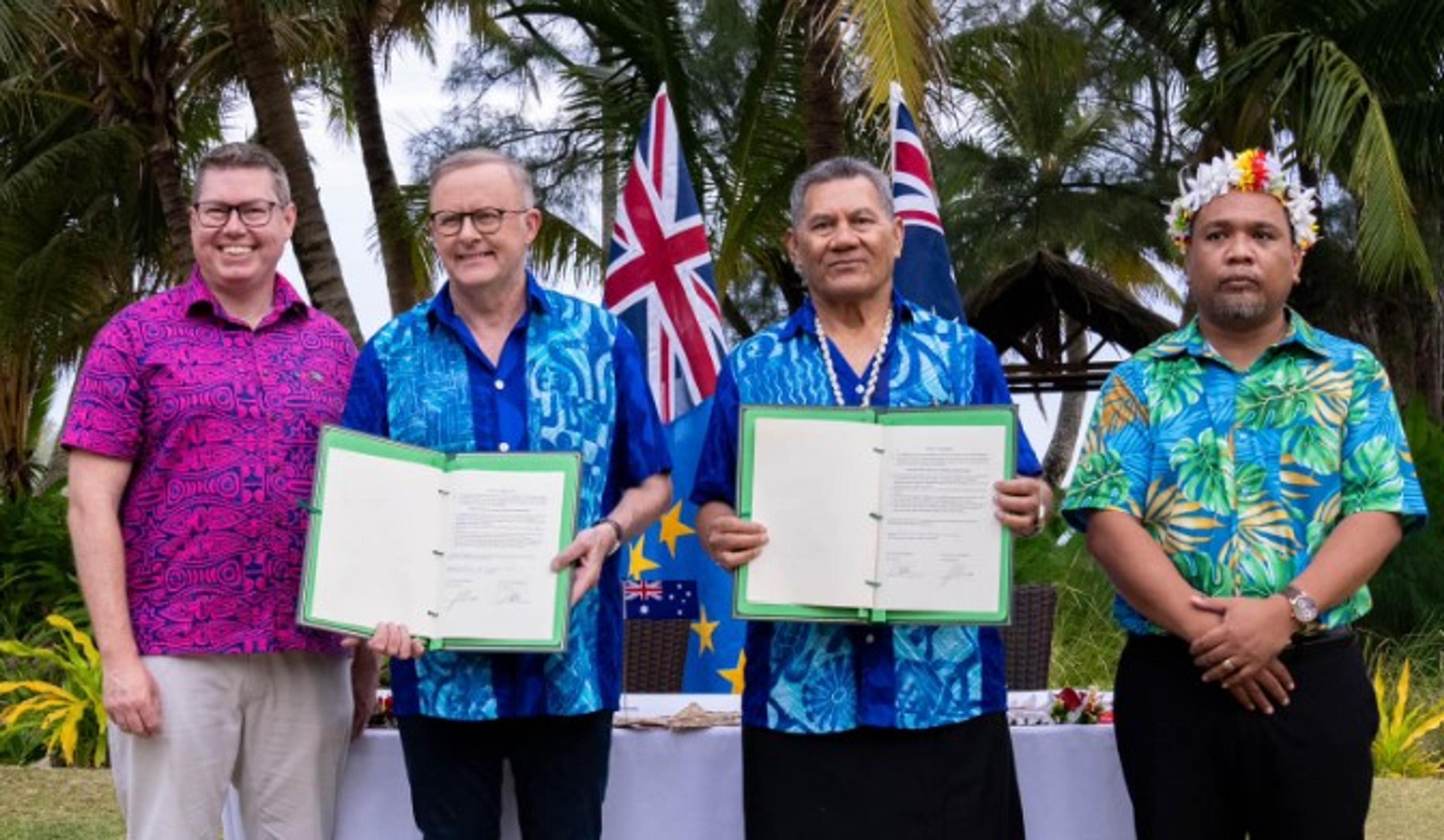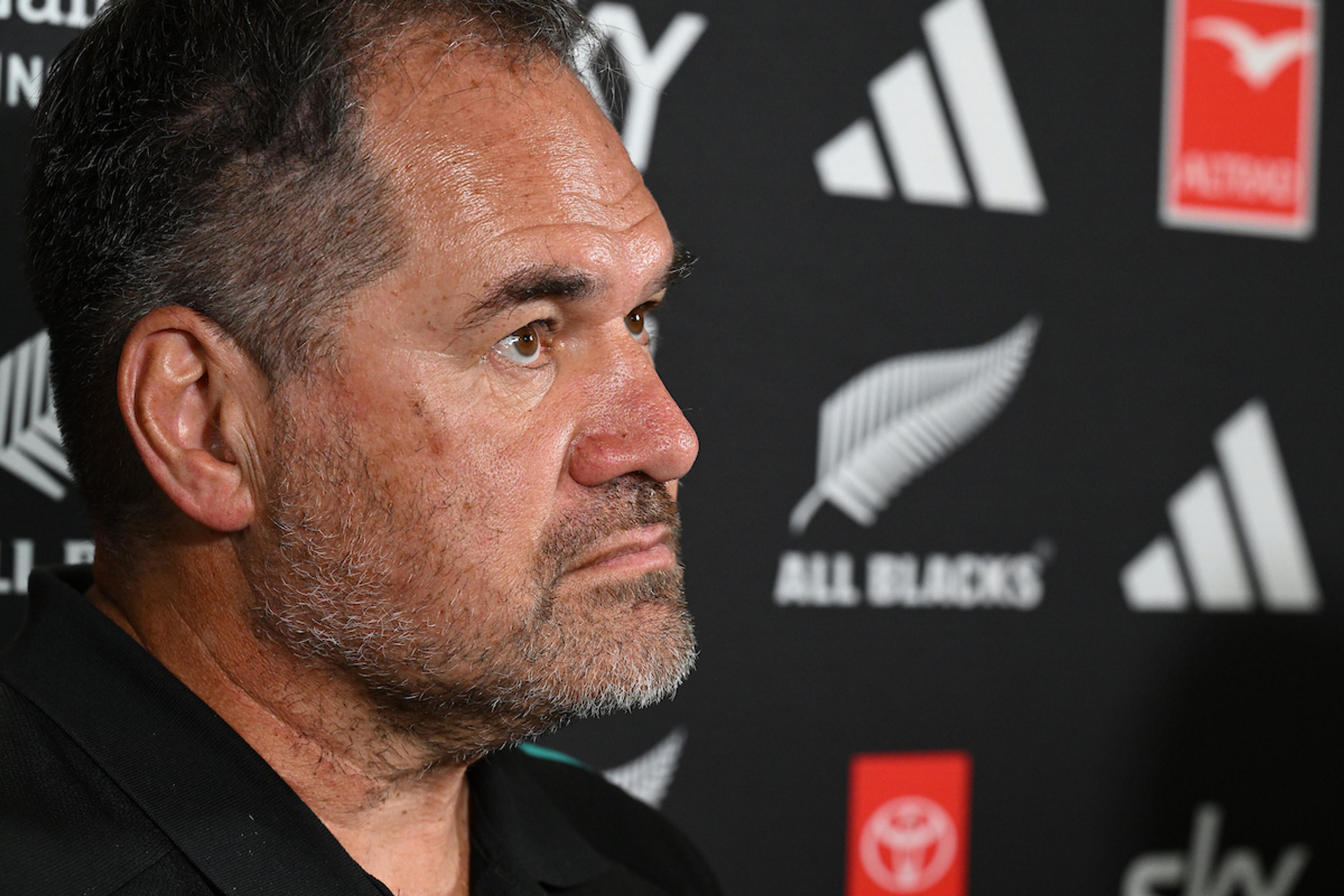

Australia's Prime Minister Anthony Albanese (centre left) and Tuvalu's PM Kausea Natano inked the Falepili treaty at the weekend.
Facebook/Anthony Albanese
Tuvalu inks Aus deal, suggests NZ do the same with Pacific
The deal ensures funding for climate projects and visas, while Australia gets to veto Tuvalu's security agreements.



Realm relations in focus as Tokelau-NZ marks 100-year history


Dave Rennie becomes first All Blacks coach of Pacific heritage



Realm relations in focus as Tokelau-NZ marks 100-year history


Dave Rennie becomes first All Blacks coach of Pacific heritage
Tuvalu and Australia are taking their relationship to a new level, signing the Australia-Tuvalu Falepili Union on the sidelines of the Pacific Islands Forum.
Hundreds of Tuvaluans will be able to resettle in Australia each year under the terms, and access the country's health care services. The Australian government will provide $16.9 million dollars towards climate adaptation projects, increase the country’s land mass and have veto power over Tuvalu's security arrangements with any other country.
Tuvalu's Finance and Climate Minister Seve Paeniu describes the deal as a "historic milestone". Speaking to Levi Matautia-Morgan on Pacific Mornings, Paeniu explains what the Falepili Union means.
“Falepili literally means in Tuvalu ‘your neighbor’. So a house adjacent to your house. Being a neighbor, you have a duty of care and duty of respect, and you lend a hand to your neighbor who may be in need who may need assistance.”
The agreement outlines three scenarios where aid might be needed: natural disasters, a health pandemic like Covid-19, and when military protection is needed, says Paeniu.
“In the event of a military aggression, Australia is obligated, as a first responder country, to assist Tuvalu.”
Paeniu doesn’t think the latter options will happen in the "foreseeable or near-foreseeable future", and sees the main benefit of the Falepili treaty as building resilience.
“The overwhelming majority of the people of Tuvalu, want to remain behind in Tuvalu, regardless of the impact of our sea level rise now inundating much of their land.
“We have a long-term adaptation plan, which involves building more land and building upward to protect Tuvalu and safeguard itself from the impact of sea level rising, so we are working with Australia on the design of that plan and its implementation.
“So there is no question that Tuvalu will benefit from this enhanced relationship, because now Australia has an obligation to build resilience for Tuvalu to be protected and safeguard its people from the impact of climate change and sea level rise.”
Where does NZ stand in all of this?
Paeniu says they might also be looking towards New Zealand for a similar arrangement, especially around visa quotas.
“After and following the successful implementation of the Falepili, and this might take a minimum of months on the Australia side to look at the internal legislative processes, and then obviously New Zealand will be the next in line.
“If the Falepili concept treaty works successfully between Australian and Tuvalu, I do not see a reason why we cannot do the same with New Zealand, particularly on the mobility pathway access.”
New Zealand's caretaker-Deputy Prime Minister Carmel Sepuloni says some aspects of what they’re doing are similar to arrangements already in place with some Pacific nations.
“We've had quotas in place with a number of countries with respect to immigration for quite some time, we've got a Treaty of Friendship with Samoa, we've got constitutional arrangements with Tokelau, Niue and the Cook Islands.
“Their treaty that they have formed with Tuvalu is slightly different from what our experience has been and what we have done, but some of it's modeled on, I think, the experience of New Zealand and our engagement and relationships with the Pacific.”
But Massey University defence and security studies senior lecturer Anna Powles says the historic pact goes against Pacific regionalism.
Speaking to Radio New Zealand, Dr Powles says there will be questions around what the deal means for Pacific agency.
“This type of arrangement swims against the currents of self-determination and Pacific agency, which is very much at the heart of Pacific regionalism.”